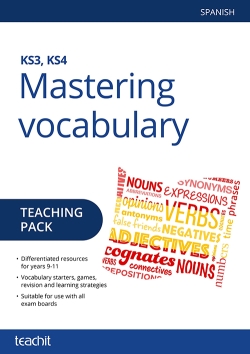Mastering vocabulary – Spanish

Mastering vocabulary – Spanish offers research and evidence-based approaches to accelerating vocabulary acquisition for KS3-4 students.
It includes differentiated PowerPoints, collaborative learning activities and photocopiable resources to support comprehension skills for students in years 9, 10 and 11.
The resources draw on:
- cognitive research into memorisation
- examiners’ reports from reading and listening papers
- vocabulary lists from all exam boards
- best classroom practice by experienced teachers.
Suitable for any exam board, this pack covers approaches to learning, vocabulary starters, games and revision, as well as exam strategies.
What's included?
- Includes vocabulary starters, games, revision, learning strategies and exam tips.
- Differentiated resources for years 9-11.
- For use with AQA, Edexcel and Eduqas/WJEC exam boards.
What's inside?
Introduction (pages 3-4)
1. Learning strategies (pages 5-17)
- 10 tips for memorising vocabulary
- Memory challenge template
- Word wheel template
- False friends quilts
2. Vocabulary starters (pages 18-42)
- Word play starters: opinions
- Triangle puzzles: time expressions
- Make the link: synonyms, antonyms and connected words
3. Vocabulary games (pages 43-52)
- Verb games
- Snakes and ladders: decodable verbs
- Speedy verb race
4. Vocabulary revision (pages 53-68)
- Take 10 words
- Revision quiz cards
- Pick ‘n’ mix worksheets
Exam Tips (page 69)
This sample is a revision resource from the Mastering vocabulary – Spanish teaching pack.
Revision quiz cards
|
Q: What do the words contento and feliz have in common?
A: They both mean happy. |
Q: What do the words divertido and entretenido have in common?
A: They both mean entertaining or fun. |
Q: What do the words fatal and malo have in common?
A: They both mean bad or awful. |
Q: If someone is muy guapo, what are they like?
A: Very good-looking. |
|
Q: If something is described as bastante guay, what is it like?
A: Quite cool. |
Q: What is the opposite of difícil?
A: Fácil. |
Q: What is the opposite of útil?
A: Inútil. |
Q: Does the word ahora relate to the past, present or future?
A: Present. |
|
Q: Which of the following is not a past time phrase?
A: 3 (today). |
Q: Which time frame do you associate with the word próximo?
A: Future. |
Q: What is the link between centro comercial and tienda?
A: You find tiendas (shops) in the centro comercial (shopping centre). |
Q: What is the literal meaning of the parts of the phrase el fin de semana?
A: The end of week (week end) |
|
Q: When is antes?
A: Before. |
Q: What is the connection between the words nuevo and viejo?
A: They are antonyms (opposites) –new/old. |
Q: If something is tonto what is it?
A: Silly. |
Q: If something is sano, is it good or bad for your health?
A: Good (healthy). |
All reviews
Have you used this resource?
Review this resource01/09/2021
28/06/2021
22/06/2021
